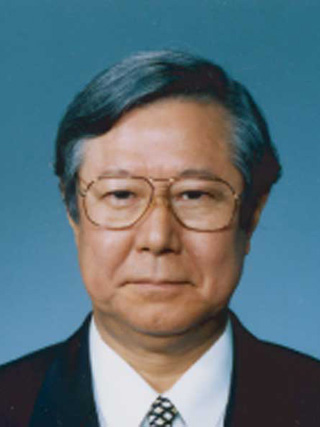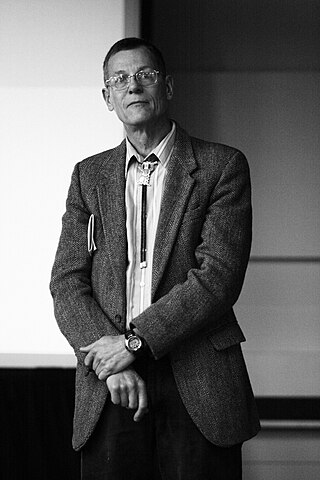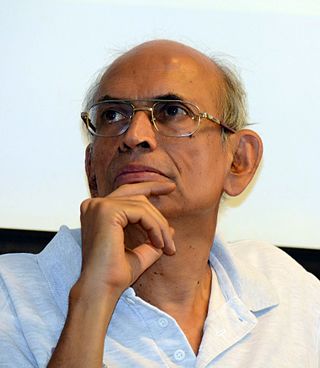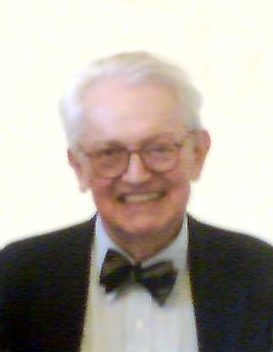Related Research Articles

Heisuke Hironaka is a Japanese mathematician who was awarded the Fields Medal in 1970 for his contributions to algebraic geometry.

Richard Charles Lewontin was an American evolutionary biologist, mathematician, geneticist, and social commentator. A leader in developing the mathematical basis of population genetics and evolutionary theory, he applied techniques from molecular biology, such as gel electrophoresis, to questions of genetic variation and evolution.

The Eugenics Record Office (ERO), located in Cold Spring Harbor, New York, United States, was a research institute that gathered biological and social information about the American population, serving as a center for eugenics and human heredity research from 1910 to 1939. It was established by the Carnegie Institution of Washington's Station for Experimental Evolution, and subsequently administered by its Department of Genetics.

William Ball Provine was an American historian of science and of evolutionary biology and population genetics. He was the Andrew H. and James S. Tisch Distinguished University Professor at Cornell University and was a professor in the Departments of History, Science and Technology Studies, and Ecology and Evolutionary Biology.

Julian Lowell Coolidge was an American mathematician, historian, a professor and chairman of the Harvard University Mathematics Department.

Madhav Dhananjaya Gadgil is an Indian ecologist, academic, writer, columnist and the founder of the Centre for Ecological Sciences, a research forum under the aegis of the Indian Institute of Science. He is a former member of the Scientific Advisory Council to the Prime Minister of India and the Head of the Western Ghats Ecology Expert Panel (WGEEP) of 2010, popularly known as the Gadgil Commission.

Temple Ferris Smith is an emeritus professor in biomedical engineering who helped to develop the Smith-Waterman algorithm with Michael Waterman in 1981. The Smith-Waterman algorithm serves as the basis for multi sequence comparisons, identifying the segment with the maximum local sequence similarity, see sequence alignment. This algorithm is used for identifying similar DNA, RNA and protein segments. He was director of the BioMolecular Engineering Research Center at Boston University for twenty years and is now professor emeritus.

William C. Wimsatt is professor emeritus in the Department of Philosophy, the Committee on Conceptual and Historical Studies of Science, and the Committee on Evolutionary Biology at the University of Chicago. He is currently a Winton Professor of the Liberal Arts at the University of Minnesota and Residential Fellow of the Minnesota Center for Philosophy of Science. He specializes in the philosophy of biology, where his areas of interest include reductionism, heuristics, emergence, scientific modeling, heredity, and cultural evolution.
Henry Shoemaker Conard was a leading authority on bryophytes and water lilies, as well as an early advocate of environmental preservation. From 1906 to 1955, Professor Conard worked at Grinnell College in Grinnell, Iowa. In 1954, he became the first to receive the Eminent Ecologist Award from the Ecological Society of America, an award that has continued annually ever since.

Charles Pence Slichter was an American physicist, best known for his work on nuclear magnetic resonance and superconductivity.
Avner Friedman is Distinguished Professor of Mathematics and Physical Sciences at Ohio State University. His primary field of research is partial differential equations, with interests in stochastic processes, mathematical modeling, free boundary problems, and control theory.
Nam-Hai Chua FRS is a Singaporean botanist. He is an Andrew W. Mellon Emeritus Professor at Rockefeller University. He is now deputy chairman of Temasek Life Science Laboratory.

Kamaljit Singh Bawa, FRS is an evolutionary ecologist, conservation biologist and a distinguished professor of Biology at the University of Massachusetts, Boston. He is also the founder of Ashoka Trust for Research in Ecology and Environment (ATREE). In 2012, Bawa received the first Gunnerus Sustainability Award, the world's major international award for work on sustainability. He is an elected member of the American Academy of Arts and Sciences. He was elected a Member of the American Philosophical Society in 2019.

Stephen C. Harrison is professor of biological chemistry and molecular pharmacology, professor of pediatrics, and director of the Center for Molecular and Cellular Dynamics of Harvard Medical School, head of the Laboratory of Molecular Medicine at Boston Children's Hospital, and investigator of the Howard Hughes Medical Institute.
Marcus William Feldman is the Burnet C. and Mildred Finley Wohlford Professor of Biological Sciences, director of the Morrison Institute for Population and Resource Studies, and co-director of the Center for Computational, Evolutionary and Human Genomics (CEHG) at Stanford University. He is an Australian-born mathematician turned American theoretical biologist, best known for his mathematical evolutionary theory and computational studies in evolutionary biology, and for originating with L. L. Cavalli-Sforza the theory of cultural evolution.

Lynne Elizabeth Maquat is an American biochemist and molecular biologist whose research focuses on the cellular mechanisms of human disease. She is an elected member of the American Academy of Arts and Sciences, the National Academy of Sciences and the National Academy of Medicine. She currently holds the J. Lowell Orbison Endowed Chair and is a professor of biochemistry and biophysics, pediatrics and of oncology at the University of Rochester Medical Center. Professor Maquat is also Founding Director of the Center for RNA Biology and Founding Chair of Graduate Women in Science at the University of Rochester.
Aaron M. Ellison is an American ecologist, photographer, sculptor, and writer. He retired in July 2021 after 20 years as the senior research fellow in ecology at Harvard University and as a Senior Ecologist at the Harvard Forest. He also served as deputy director of the Harvard Forest from 2018 to 2021. Until 2018, he also was an adjunct research professor at the University of Massachusetts in the Departments of Biology and Environmental Conservation. Ellison has both authored and co-authored numerous scientific papers, books, book reviews and software reviews. For more than 30 years, Ellison has studied food-web dynamics and community ecology of wetlands and forests; the evolutionary ecology of carnivorous plants; the responses of plants and ants to global climate change; application of Bayesian statistical inference to ecological research and environmental decision-making; and the critical reaction of Ecology to Modernism. In 2012 he was elected a fellow of the Ecological Society of America. He was the editor-in-chief of Ecological Monographs from 2008 to 2015, was a senior editor of Methods in Ecology and Evolution from 2018-2021, and since 2021 has been the executive editor of Methods in Ecology and Evolution.
Daniel L. Hartl is the Higgins Professor of Biology in the Department of Organismic and Evolutionary Biology at Harvard University. He is also a principal investigator at the Hartl Laboratory at Harvard University. His research interests are focused on evolutionary genomics, molecular evolution, and population genetics.
The term population biology has been used with different meanings.

David P. Mindell is an American evolutionary biologist and author. He is currently a senior researcher at the University of California, Berkeley, Museum of Vertebrate Zoology. Mindell's work is focused on the systematics, conservation and molecular evolution of birds, especially birds of prey. He is known for his 2006 book, The Evolving World in which he explained, for the general public, how evolution applies to everyday life.
References
- ↑ Flaherty, Julie (April 15, 1998). "Harvard Breaks a Housemaster Mold" – via NYTimes.com.
- ↑ "William H. Bossert | Harvard John A. Paulson School of Engineering and Applied Sciences". www.seas.harvard.edu.
- ↑ "William Bossert - The Mathematics Genealogy Project". www.genealogy.math.ndsu.nodak.edu. Retrieved 2021-12-31.
- ↑ "A Primer of Population Biology". Oxford University Press. June 1, 1971.